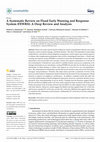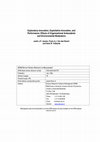Papers by Salem Said Salem Al Abri
Cogent Business & Management, Sep 10, 2023

I praise my Lord for He has guided me and strengthened me throughout my PhD journey. 1 was fortun... more I praise my Lord for He has guided me and strengthened me throughout my PhD journey. 1 was fortunate to have Professor Zhen Xiong Chen as my supervisor and chair of my committee. I would lii<e to express my sincere gratefulness for all his guidance, support, encouragement, and patience throughout my PhD journey. My thanks also go to my PhD committee members Dr. Thomas Kalliath and Hui Wang for serving in my PhD committee. I would also like to extend my thanks to Khalid AlAbri and Riyadh AITamami for their great help during the data collection process, and to all participants in this study for their time and willingness to share information. 1 would also like to thank Jerry Marmen for his help with data analysis. 1 appreciate his time teaching me how to use the data analysis software. My heartfelt love and thanks to my mother Aisha, my wife Azhar, and my children Mohammed, Hamza and Omar and all other family members. Their patience, being far away from me for so long, and their prayers were greatly needed and always supportive all the way through. As an expression of my deepest love, I dedicate this thesis to them. Finally, I would like to thank Sultan Qaboos University for sponsoring my doctoral study at the Australian National University (ANU). 1 would also like to thank the School of Management, Marketing and International Businesses at ANU for the additional funding they provided me towards completing my PhD study.

I praise my Lord for He has guided me and strengthened me throughout my PhD journey. 1 was fortun... more I praise my Lord for He has guided me and strengthened me throughout my PhD journey. 1 was fortunate to have Professor Zhen Xiong Chen as my supervisor and chair of my committee. I would lii<e to express my sincere gratefulness for all his guidance, support, encouragement, and patience throughout my PhD journey. My thanks also go to my PhD committee members Dr. Thomas Kalliath and Hui Wang for serving in my PhD committee. I would also like to extend my thanks to Khalid AlAbri and Riyadh AITamami for their great help during the data collection process, and to all participants in this study for their time and willingness to share information. 1 would also like to thank Jerry Marmen for his help with data analysis. 1 appreciate his time teaching me how to use the data analysis software. My heartfelt love and thanks to my mother Aisha, my wife Azhar, and my children Mohammed, Hamza and Omar and all other family members. Their patience, being far away from me for so long, and their prayers were greatly needed and always supportive all the way through. As an expression of my deepest love, I dedicate this thesis to them. Finally, I would like to thank Sultan Qaboos University for sponsoring my doctoral study at the Australian National University (ANU). 1 would also like to thank the School of Management, Marketing and International Businesses at ANU for the additional funding they provided me towards completing my PhD study.

Sustainability, 2021
Flood is the major natural hazard in Malaysia in terms of populations affected, area extent, freq... more Flood is the major natural hazard in Malaysia in terms of populations affected, area extent, frequency, social–economic damage, and flood duration. This shows the importance of providing comprehensive and effective flood mitigation management, which requires government agencies to enhance their employment performance that involves technological innovation. A flood early warning and response system (FEWRS) is essential to ensure that all stakeholders receive the right information and are provided with necessary actions and response information to avoid loss of lives and property. It should have some effective usability features and success components of its strategic information access and display; existing FEWRS fail and often do not effectively provide information on flood disasters to reduce their impacts at a local level to save the population’s lives. The measurement of information system (IS) success remains a top concern for researchers, managers, and practitioners. Therefore,...
Culture and Gender in Leadership

Journal of Intellectual Capital, Feb 25, 2021
PurposeThis study aims to investigate the role of the components of intellectual capital (IC) on ... more PurposeThis study aims to investigate the role of the components of intellectual capital (IC) on entrepreneurial opportunity recognition among small and medium enterprises (SMEs) in the Sultanate of Oman. The interrelationships of these components are also examined.Design/methodology/approachThe study used quantitative research methods. Data were collected using structured questionnaires from a sample of 347 respondents from SMEs operating in Oman. Structural equation modeling was employed to examine the hypotheses using partial least square technique.FindingsThe analysis results demonstrate that structural capital, relational capital and spiritual capital have significant relationships with entrepreneurial opportunity recognition. Meanwhile, human capital has no relationship with either entrepreneurial opportunity recognition or spiritual capital. Intriguingly, significant interrelationships are observed among IC's components.Practical implicationsThis study offers useful managerial implications for the related parties: firms, public institutions and other stakeholders. The findings could be a guideline for SME managers/owners to recognize the right entrepreneurial opportunity.Originality/valueTo the best of our knowledge, this study is the first to reveal the relationships between the tripartite model of IC and entrepreneurial opportunity recognition. This study is also the first to test the interrelationship of spiritual capital on other intellectual components.

Quality & Quantity, May 27, 2021
The objectives of this study are to examine the influence of knowledge sharing and inter-departme... more The objectives of this study are to examine the influence of knowledge sharing and inter-departmental connectedness on exploratory innovation, exploitative innovation, and firm’s operational performance; the influence of exploratory and exploitative innovations on firm’s operational performance; and the moderating effect of environmental competitiveness. The data was collected from the banking industry in Bangladesh through a cross-sectional survey of 241 managers and analyzed through structural equation modeling using SmartPLS software. Findings show that knowledge sharing, and inter-departmental connectedness contribute to develop both exploratory and exploitative innovation as well as enhance firm’s operational performance. Moreover, exploratory and exploitative innovation influences a firm’s operational performance. Finally, environmental competitiveness negatively affects the relationship of knowledge sharing and inter-departmental connectedness with operational performance. The findings emphasize the flexible and informal social relations among people in creating effective exploratory and exploitative innovation and enhancing firms’ operational performance. It suggests that knowledge sharing, and inter-departmental connectedness as an informal and flexible coordination mechanism are more important in predicting operational performance if the level of environmental competitiveness is low.

The International Journal of Entrepreneurship and Innovation
Purpose: The purpose of this paper is to 1) examine the influence of firm-level entrepreneurial a... more Purpose: The purpose of this paper is to 1) examine the influence of firm-level entrepreneurial attitude toward innovation, subjective norms for innovation, and perceived control over innovation on firms’ intention for innovation; 2) study the influence of firms’ intention for innovation on new product development performance; 3) test the effect of new product development performance on firms’ financial performance. Design/methodology/approach: The proposed theoretical model has been analyzed through structural equation modelling using SmartPLS software and structured questionnaires has been distributed among 244 entrepreneurs in Oman. Findings: By empirically testing the antecedents of the firm-level entrepreneurs’ intention with a focus on existing firms (not their intention for new venture creation), it was found that attitudes toward innovation and perceived behavioral control do predict firm-level entrepreneurs’ intention for innovation. The firm-level entrepreneurs’ intention ...

Journal of Intellectual Capital
PurposeThis study aims to investigate the role of the components of intellectual capital (IC) on ... more PurposeThis study aims to investigate the role of the components of intellectual capital (IC) on entrepreneurial opportunity recognition among small and medium enterprises (SMEs) in the Sultanate of Oman. The interrelationships of these components are also examined.Design/methodology/approachThe study used quantitative research methods. Data were collected using structured questionnaires from a sample of 347 respondents from SMEs operating in Oman. Structural equation modeling was employed to examine the hypotheses using partial least square technique.FindingsThe analysis results demonstrate that structural capital, relational capital and spiritual capital have significant relationships with entrepreneurial opportunity recognition. Meanwhile, human capital has no relationship with either entrepreneurial opportunity recognition or spiritual capital. Intriguingly, significant interrelationships are observed among IC's components.Practical implicationsThis study offers useful manag...

Journal of Family Business Management, 2021
PurposeThis study investigates the influence of inclusion of nonfamily employees in family firms ... more PurposeThis study investigates the influence of inclusion of nonfamily employees in family firms on their intellectual, social and affective engagement at the workplace. Furthermore, the framework proposed in the study considers the possible moderating influence of procedural justice in the above relationships.Design/methodology/approachA conceptual framework is developed with the support of the self-determination theory (SDT) and the social exchange theory. The study tests a set of hypotheses using survey data from 654 nonfamily employees working in private family firms in Malaysia.FindingsThe results reveal that inclusion has a positive and significant relationship with intellectual, social and affective engagement. While procedural justice moderates the association between inclusion and intellectual and affective engagement, it does not moderate the relationship between inclusion and social engagement.Research limitations/implicationsThe outcome of this study presents a nuanced u...
Middle East J. of Management, 2022
Entrepreneurship in the Gulf Cooperation Council Region, 2021

International Journal of Islamic and Middle Eastern Finance and Management, 2016
Purpose The purpose of this study is to examine whether and how the fundamental Islamic values of... more Purpose The purpose of this study is to examine whether and how the fundamental Islamic values of Arab Muslim business negotiators influence their views of the negotiation process and negotiation behavior. Design/methodology/approach The study is based on an interpretive qualitative approach. The data were obtained by semi-structured interviews. The participants were managers whose role entails negotiations as an essential component of their job. Findings For Arab Muslim negotiators, the use of knowledge is associated with a moral imperative of being truthful and using knowledge responsibly. The virtues of honesty, transparency, trust, integrity, fairness, peace, respect and concern for the counterpart’s negotiation outcomes emerged as important considerations for Arab Muslim negotiators. Research limitations/implications All the research participants were from an Arab Islamic country. Empirical data obtained from non-Arab Islamic respondents can provide further insights into how re...
Business and Professional Ethics Journal

Culture and Gender in Leadership, 2013
ABSTRACT Despite recent interest in exploring leadership practices in the Middle East, still litt... more ABSTRACT Despite recent interest in exploring leadership practices in the Middle East, still little is known about this important part of the world (Common, 2011; Pellegrini &amp; Scandura, 2006; Scandura, von Glinow, &amp; Lowe, 1999). This dearth in research has been attributed largely to the difficulty in gathering data (Dorfman &amp; House, 2004; Scandura et al., 1999). Despite this challenge, however, and as the region is increasingly becoming a hub for foreign investments (Pellegrini &amp; Scandura, 2006), more research is needed to explore effective leadership practices. The need for such research is becoming even more significant as the region is currently undergoing considerable transformation fuelled by the public uprisings that have swept the Arab World recently. Thus, by conducting the current research in Oman, we intended to make a contribution to the leadership literature by increasing our understanding of visionary leadership. The majority of research conducted on leadership in the Middle East has focused primarily on the influence of the local culture and societal structures on leadership practices. For instance, Neal, Finlay, and Tansey (2005) examined the influence of tradition and tribal elements in modern management in the Arab Gulf, including Oman. Similarly, Ali (1995; 1989) identified key cultural prototypes of Arab leadership, particularly the traditional relationship between the tribal leader (or sheik) and the tribe. A more recent study by Almoharby (2010) has refined this work by highlighting another key influence on modern Arab leadership and management – a traditional form of highly consultative, or shuratic, decision making. Looking at gender differences, Al-Lamky (2007) and Al-Lamki (1999) highlighted the experience of women in the Arab Gulf workplace and identified the challenges they face as they rise into leadership positions.
Using the psychological ownership theory, we developed and tested a model linking delegation with... more Using the psychological ownership theory, we developed and tested a model linking delegation with felt responsibility and proactive behavior through psychological ownership. A structural equation analysis of the study variables (n = 253) revealed that delegation positively predicted felt responsibility fully mediated by psychological ownership. Delegation also positively predicted proactive behavior, partially mediated by psychological ownership. Moreover, power distance negatively moderated the relationship between delegation and psychological ownership. Theoretical and practical implications of the findings are discussed.

Management Science, 2006
Research on exploration and exploitation is burgeoning, yet our understanding of the antecedents ... more Research on exploration and exploitation is burgeoning, yet our understanding of the antecedents and consequences of both activities remains rather unclear. We advance the growing body of literature by focusing on the apparent differences of exploration and exploitation and examining implications for using formal (i.e., centralization and formalization) and informal (i.e., connectedness) coordination mechanisms. This study further examines how environmental aspects (i.e., dynamism and competitiveness) moderate the effectiveness of exploratory and exploitative innovation. Results indicate that centralization negatively affects exploratory innovation, whereas formalization positively influences exploitative innovation. Interestingly, connectedness within units appears to be an important antecedent of both exploratory and exploitative innovation. Furthermore, our findings reveal that pursuing exploratory innovation is more effective in dynamic environments, whereas pursuing exploitativ...

Using the role theory and self-efficacy theory, we developed and tested a model that examined the... more Using the role theory and self-efficacy theory, we developed and tested a model that examined the mediating effect of role clarity and role-related self-efficacy between directive leadership and outcome variables of job satisfaction and performance. The study also examined power distance and uncertainty avoidance as moderating variables. A structural equation analysis of the study variables (n = 253) revealed that role clarity and role-related self-efficacy sequentially mediated the relationship between directive leadership and job satisfaction. However, only role clarity mediated the effect of directive leadership on job performance. Power distance moderated the relationship between directive leadership and role clarity. Moreover, uncertainty avoidance moderated the relationship between role clarity and role-related self-efficacy. Theoretical and practical implications are discussed.











Uploads
Papers by Salem Said Salem Al Abri